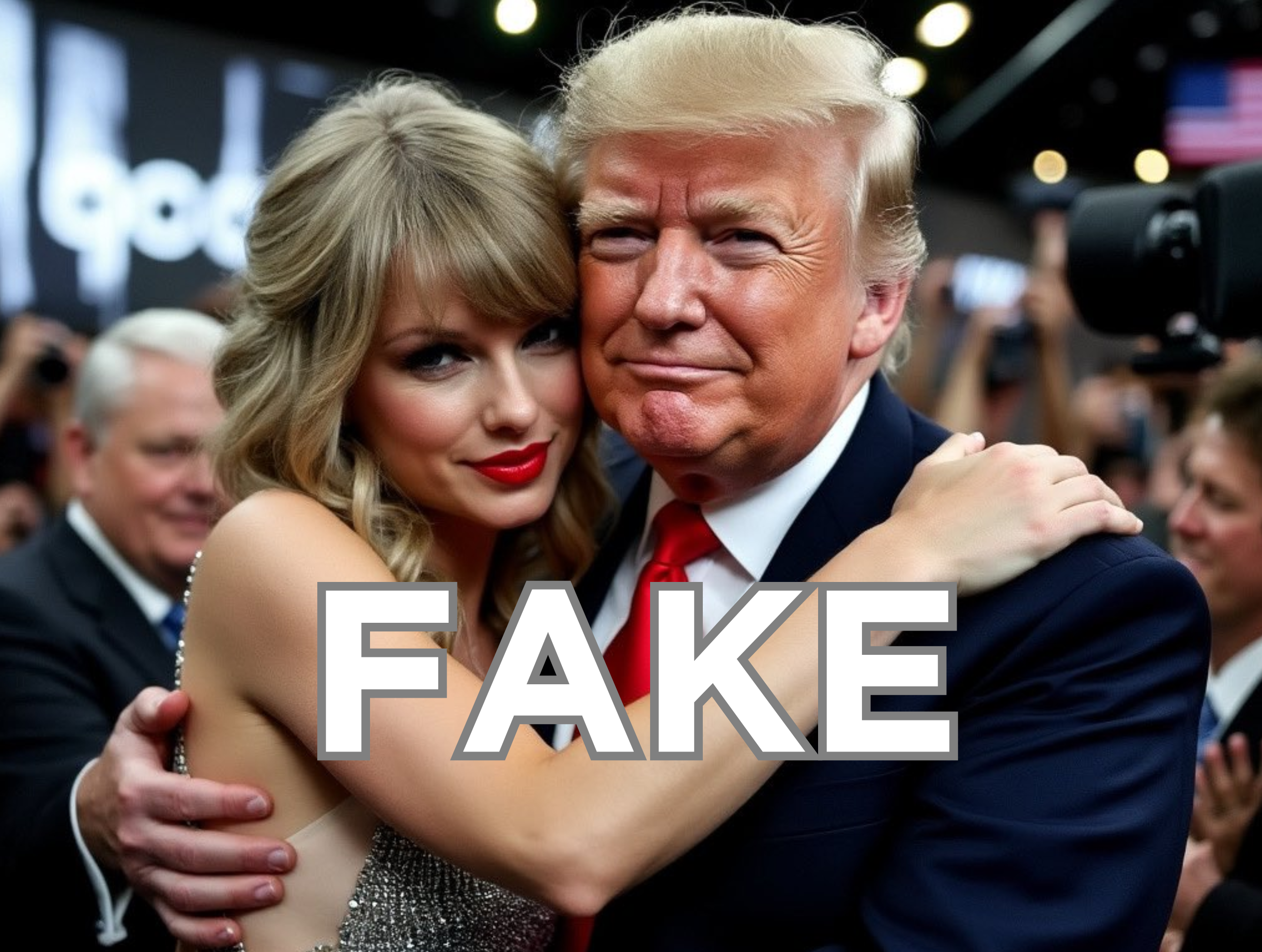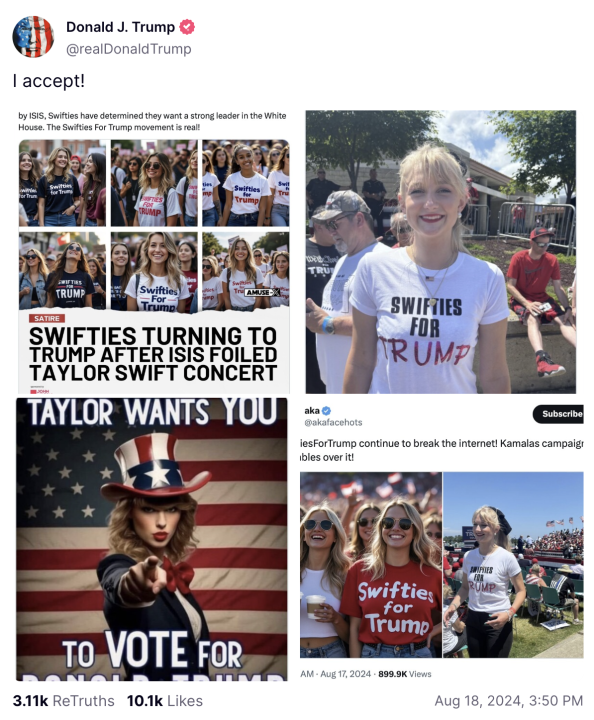Fake it off: AI-generated Taylor Swift pics spark controversy
Viral fake Taylor Swift footage circulated on social media following a fake endorsement posted by Trump and Swift’s real endorsement of Harris
Fake it off: AI-generated Taylor Swift pics spark controversy

Banner: Example of one of the many AI-generated images involved Taylor Swift and Donald Trump. (Source: @Syntriel / archive)
In the lead-up to the November 2024 US presidential election, pop star Taylor Swift found herself the unwitting subject of a viral disinformation campaign featuring convincing but fake AI-generated images. On August 18, 2024, former President Donald Trump and others began circulating images on social media purporting to show Swift and her fans endorsing Trump for president. These manufactured images, originally posted by satirical accounts on X (formerly Twitter), quickly went viral.
A second wave of AI-generated content targeting Swift emerged on September 10, after the singer posted a real endorsement on Instagram of Democratic nominee Kamala Harris following a presidential debate. Swift’s post expressed concern about the dangers of AI-generated misinformation like the fake images of her previously shared by Trump. In response, new fake AI images began to spread, portraying Swift as a communist and referencing outlandish claims made by Trump during the debate. Yet despite these attacks on Swift, Trump’s campaign began selling Swift-inspired merchandise. The incidents demonstrate the growing challenge AI-generated content poses heading into the 2024 elections.
Round one: fake images of Swift endorsing Trump
On August 18, 2024, former US President Donald Trump posted fake images of global pop star Taylor Swift that had been created with generative artificial intelligence (GAI). The images portrayed Swift dressed as Uncle Sam with the headline, “Taylor Wants You to Vote for Donald Trump.” The post, which appeared on Trump’s Truth Social platform, included images of other women dressed in T-shirts reading “Swifties for Trump” across the front.



The images posted by Trump on August 18 were screenshots of GAI images originally posted to X the previous day by the accounts @amuse and @akafacehots. The @amuse account, whose bio says “Conservative Headlines w/ a Dash of Satire and Ai [sic],” labeled its post as satire. It claimed that Swift fans are seeking a strong leader in the White House after the cancelation of a Taylor Swift concert in Vienna due to a suspected terror attack. @amuse followed up with two posts saying that the images were intended to be satirical; since their posting, they have been viewed 1.2 million times.


Other users piled on after the initial posting. Accounts replied with their own GAI images depicting Swift with Trump and showing support for him. One example circulated by users included a manipulated picture of Swift holding a “Trump won” flag at the Grammy Awards. Most of these images received much less circulation than the ones that inspired it, often attracting just hundreds of views.


Round two: more GAI images after Swift’s endorsement of Harris
A second wave of AI-generated fakes of Swift appeared online after her endorsement of Vice President Harris on September 10. Posted following the 2024 US presidential debate on Instagram, she signed her endorsement, “Taylor Swift, Childless Cat Lady.” Swift’s signature is a reference to a comment made by Republican Vice Presidential nominee JD Vance in 2021 that resurfaced recently in light of his nomination. Following Swift’s post, the “Childless Cat Lady” signature became a popular hashtag on social media platforms popular among youth voters like TikTok.
In her Instagram post, Swift also expressed concerns about the synthetic images of her. “It really conjured up my fears around AI and the dangers of spreading misinformation,” she wrote. “It brought me to the conclusion that I need to be very transparent about my actual plans for this election as a voter. The simplest way to combat misinformation is with the truth.”

Swift’s endorsement message included a reminder about voter registration and early voting. The official voter registration website of the United States government, vote.gov, saw a surge of more than 406,000 visitors within 24 hours of Swift’s post. Similarly in 2023, an Instagram post from Swift about voter registration drove a surge of more than 35,000 new voter registrations. The CEO of Vote.org, an advocacy organization which assists with voter registration but is distinct from vote.gov, reported that following the post, vote.org averaged 13,000 users every 30 minutes—a “1,226% jump in participation in the hour after the post.”
Notably, the GAI images of Swift posted to social media following her September 10 endorsement of Harris were of a different nature than the ones shared the previous month. Many images criticized her endorsement and portrayed Swift as a communist.

Other posts contained language in reference to a false rumor repeated by Trump during the presidential debate that immigrants in Springfield, Ohio were eating the pets of local residents. Debate moderators noted that local officials had found zero verified reports of this happening.

On September 15, five days after Swift’s endorsement of Harris, Trump posted, “I HATE TAYLOR SWIFT!” to Truth Social.

Despite this personal attack on Swift, the Trump campaign’s official online store is currently selling a Swift-inspired T-shirt named “Trump Era.” An X account named @trumpswiftie, which was created in July and currently has more than 21,000 followers, promoted the new campaign merchandise in several posts. @trumpswiftie says in its bio that it is not affiliated with Swift.

Using the social media analytics platform Meltwater Explore, a DFRLab query of the keywords “Trump” and “Swift” between August 15 and September 16 showed peaks in social media posts mentioning them that corresponded with both Trump’s Truth Social posts and Swift’s Instagram endorsement. Specifically, the first peak on August 18-19 aligned with Trump’s August 18 posts containing AI-generated images falsely suggesting she had endorsed him. A second, much larger peak on September 10-12 aligned with Swift’s Instagram endorsement of Harris following the US presidential debate. On September 15-16, an even larger third peak aligned with Trump’s post on Truth Social announcing that he hated Swift. The query terms “Trump” and “Swift” were mentioned more than 1.28 million times in social media posts, demonstrating the popularity of the topic.


Not all of the AI-generated images of Swift during the run-up to the 2024 election have been political. Earlier this year, fake sexually explicit images of Swift circulated online; later investigations found that they originated on 4chan before spreading to other social media platforms. The incident forced X to temporarily block searches for Swift on the platform to limit the spread of those images.
Cite this case study:
Dina Sadek and Beatriz Farrugia, “Fake it off: AI-generated Taylor Swift pics spark controversy,” Digital Forensic Research Lab (DFRLab), September 17, 2024, https://dfrlab.org/2024/09/17/taylor-swift-ai-fake-it-off/.

